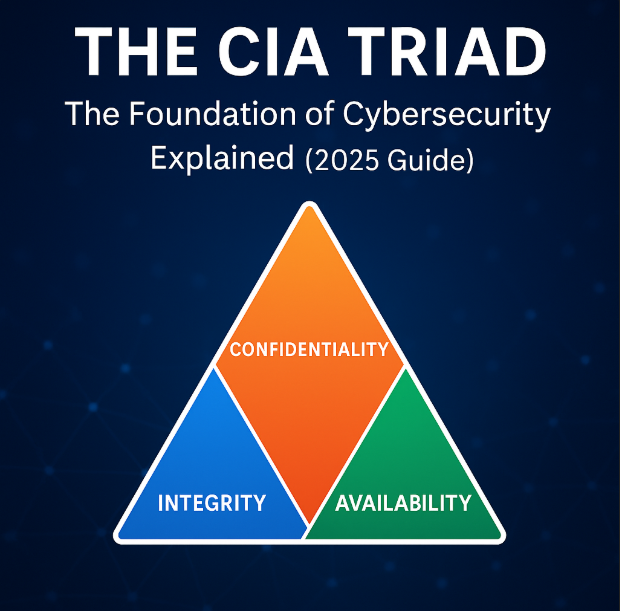The CIA Triad in Cybersecurity: Confidentiality, Integrity & Availability Explained (2025 Guide)
A complete, easy-to-understand guide to the CIA Triad — the foundation of cybersecurity. Learn with real-world examples, case studies, and future insights.
9/26/20253 min read


The CIA Triad: The Foundation of Cybersecurity Explained (2025 Guide)
Introduction
If cybersecurity were a building, the CIA Triad would be its three strongest pillars. Every security policy, tool, and framework is built upon it.
But here’s the catch: “CIA” here doesn’t mean the Central Intelligence Agency. Instead, it stands for Confidentiality, Integrity, and Availability — the three core principles of protecting information in the digital world.
In this blog, written by Our Secure Universe Pvt Ltd, we will break down the CIA Triad in the simplest way possible, with professional insights and real-world examples that every business and individual can relate to.
What is the CIA Triad?
The CIA Triad is a security model that helps organizations and individuals protect data.
Confidentiality → Keeping data private.
Integrity → Keeping data accurate and trustworthy.
Availability → Making sure data is accessible when needed.
Together, these three elements form the foundation of cybersecurity. If one fails, security is compromised.
1. Confidentiality – Keeping Information Secret
What It Means
Confidentiality ensures that only authorized people can access sensitive data. Think of it as a “Do Not Enter” sign for your digital files.
Real-World Examples
Banking: Only you (and not hackers) should see your online banking details.
Healthcare: Patient records must be visible only to doctors and not to outsiders.
Business: A company’s financial reports should be protected from competitors.
How Confidentiality is Maintained
Strong passwords and encryption.
Multi-factor authentication (2FA).
Access control policies.
👉 Case Study: In 2019, Capital One suffered a breach where 100 million customer records were exposed because cloud configuration wasn’t secured. This was a confidentiality failure.
2. Integrity – Keeping Information Accurate
What It Means
Integrity ensures that data is trustworthy, accurate, and unaltered. No unauthorized changes should be made.
Real-World Examples
Email Integrity: If your CEO emails an instruction, the content must not be altered mid-way by hackers.
E-commerce: An online store must not show a product’s price as $10 instead of $100 due to malicious edits.
Healthcare: A patient’s medical record must remain unchanged unless updated by authorized staff.
How Integrity is Maintained
Digital signatures and checksums.
Version control and audit logs.
Intrusion detection systems.
👉 Case Study: In 2010, the Stuxnet worm targeted Iran’s nuclear program. It altered system data so operators believed everything was fine, while equipment was being destroyed. This was a direct integrity attack.
3. Availability – Keeping Information Accessible
What It Means
Availability ensures that data and systems are accessible to authorized users whenever they need it. No matter how secure a system is, if it’s always down, it’s useless.
Real-World Examples
Banking: ATMs and online transactions should be available 24/7.
E-commerce: Websites must stay up during peak sales (like Black Friday).
Healthcare: Doctors must have immediate access to patient records in emergencies.
How Availability is Maintained
Regular system updates and backups.
Redundant servers and load balancing.
Disaster recovery planning.
👉 Case Study: In 2016, the Dyn DDoS Attack took down major websites like Twitter, Netflix, and Reddit for hours. This was an availability failure caused by hackers flooding servers with traffic.
Why the CIA Triad Matters for Businesses
The CIA Triad is not just a theory — it directly impacts business survival:
Without confidentiality → customer trust is destroyed.
Without integrity → decisions are based on false data.
Without availability → operations stop, leading to huge losses.
👉 Example: An e-commerce company with millions of customers must protect card details (confidentiality), ensure order details are not altered (integrity), and keep the website running during high traffic (availability).
The Balance Between CIA Triad Principles
Sometimes, businesses face a trade-off:
Too much focus on confidentiality (like strict login rules) may reduce availability (harder access for employees).
Prioritizing availability (like open access) may risk confidentiality.
The goal is to find the right balance that matches business needs.
The CIA Triad in 2025 and Beyond
AI Security → AI tools will detect breaches faster but must also follow CIA principles.
Zero Trust Architecture → aligns strongly with confidentiality and integrity.
Cloud & IoT Expansion → availability will become even more critical.
CTEM (Continuous Threat Exposure Management) → will actively test all three elements of the CIA Triad.
FAQs About the CIA Triad
Q1. Is the CIA Triad only for IT professionals?
No. It’s a universal principle that applies to anyone using digital systems, from individuals to global corporations.
Q2. Which element is most important?
All three are equally critical. Weakness in one usually affects the others.
Q3. How does the CIA Triad relate to compliance?
Data protection laws like GDPR, HIPAA, and India’s DPDP Act are all built on CIA principles.
Conclusion
The CIA Triad — Confidentiality, Integrity, and Availability — is the foundation of modern cybersecurity. It protects data from being stolen, manipulated, or made inaccessible.
At Our Secure Universe Pvt Ltd, we help businesses apply the CIA Triad through robust security strategies, continuous monitoring, and advanced defense systems.
👉 Want to strengthen your organization’s cybersecurity? Contact Our Secure Universe Pvt Ltd today.